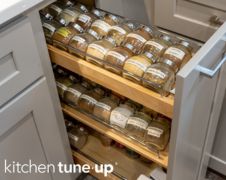How to Clean Kitchen Surfaces

Fingerprints on the steel fridge. That gooey smear on the granite countertop. Can you clean both messes the same way? You need to know the right cleanser for the surface or you risk damaging your kitchen’s looks and functionality. Check out these do-it-yourself cleaning tips for different surfaces.
Stainless Steel
To clean a steel fridge, dishwasher, range, vent hood, or oven exterior, remember: Never use abrasive cleansers, cleansers with bleach or ammonia, or scrubbing pads.
Always wipe in the direction of the steel’s grain. The grain is a pattern of tiny grooves created during manufacturing. If you clean steel “against the grain,” wiping across those crevices, you’re likelier to leave residue stuck in them. If you “go with the grain,” wiping in the same direction as the crevices, you’re less likely to deposit dulling residue. You can usually see the grain by examining the surface closely. Once you find it, get cleaning:
Club soda: Pour this bubbling liquid into a spray bottle, spray immediately and rub with a microfiber cloth. The carbonation breaks down grime.
Dish soap: Combine a teaspoon of dishwashing liquid with a cup of hot water (scale up as needed). Rub, then rinse thoroughly and dry the surface.
In all these tips, rinsing and drying are essential—without them you’re leaving soapy residue behind!
Vinegar: Spray this all-purpose cleaning hero, undiluted, onto the steel and wipe, rinse and dry. You then can drip a little olive oil, mineral oil or lemon oil onto a dry cloth and buff (with the grain, of course).
Stubborn spots: Loosen caked-on splatters with a baking soda and water paste. Leave it on for five minutes.
Laminate
These affordable countertops are layers of plastic, paper and board bonded with resins and topped with a melamine plastic surface. You can scratch, stain or singe laminates, so use trivets and cutting boards. Make your counters last with care like this:
Keep them dry. Laminates’ layers don’t like water. Always dry counters.
Dish soap: Mix a teaspoon of soap in a cup of water and rub, rinse and dry as a daily routine. Use soft toothbrushes to scrub metal edging, if your counter has it.
Vinegar: Mix one part vinegar to two parts water, or go 50-50 if you’re tackling a real mess. Rinse and dry.
Baking soda: Let a soda and water paste sit on stains for five minutes or longer.
Quartz
Quartz countertops combine quartz stone with resins and binding agents to make a nonporous surface. Don’t confuse quartz with “quartzite.” The latter is natural stone and requires repeated resealing. Manufactured quartz is a great choice because it never needs sealing. Quartz is stain-resistant, but can still get food-stained. Immediately sop up spills like coffee, tea, tomato sauce, vinegar, and soda. Dish soap and water are the go-to cleansers. For tougher jobs, try:
Vinegar: Keep a spray bottle with a 50-50 mix of white vinegar and water and use it regularly to clean and cut grease.
For gunk and ink: Use an adhesive remover like Goo Gone on ink, marker stains, glue, or chewing gum. Use a plastic scraper to pry up dried globs. Never use a metal scraper. It could gouge the surface.
Baking soda: For older or deeper stains, cover the stain with a baking soda paste, tape plastic wrap over the paste to keep it moist, and let it sit a day or more.
Isopropyl rubbing alcohol or glass cleaners: Rubbing either on stains can help, but check with the manufacturer before you use alcohol or glass cleaners on quartz.
Granite
Granite is tough, but needs sealant to resist stains. If your granite countertops get stained easily or look cloudy, they might need resealing. Despite vinegar’s great cleaning reputation, do not use it on granite. Avoid glass cleaners too. For maintenance between resealings, try these tips:
Dish soap, again: A solution of soap and water should be your daily routine, but remember: Granite is hard, but requires a soft cleansing cloth or sponge.
For water-based stains: Home improvement expert Bob Vila recommends making a thick paste of baking soda and hydrogen peroxide, spreading it on the stain, covering with plastic wrap by taping down the wrap edges, and leaving it for at least a day.
For oil-based stains: Same as above, but use water, not hydrogen peroxide.
Isopropyl rubbing alcohol: To disinfect granite, spray 70 percent isopropyl alcohol on the countertop and wipe. You can also clean (but not disinfect) with a half-and-half water and alcohol solution.
Other Surfaces
If your range top or oven front has a smooth enamel finish, Consumer Reports recommends dish soap and water with a soft sponge, and vinegar and water to cut grease. Use specialized cleaners for flat-topped ceramic glass cooktops so you don’t scratch them.
Can’t decide whether to go with stainless steel? Not sure whether quartz or laminate is right for you? Work with your local Kitchen Tune-Up expert to select the best surfaces for your home.

